新人教版七年级英语上册unit 6 Do you like bananas (Period1) 优质课课件
- 格式:ppt
- 大小:6.37 MB
- 文档页数:18

Unit 6 Do you like bananas? 讲义一、【重点单词】banana /bə'nɑ:nə/香蕉hamburger /'hæmbɜ:(r)ɡə(r)/汉堡包tomato /tə'mɑ:təʊ/西红柿ice-cream /,aɪs'kri:m/冰激凌salad /'sæləd/沙拉strawberry /'strɔ:berɪ/草莓pear /peə(r)/梨milk /mɪlk/牛奶bread /bred/面包birthday /'bɜ:(r)θdeɪ/生日dinner /'dɪnə(r)/(中午或晚上吃的)正餐week /wi:k/周;星期food /fu:d/食物sure /ʃʊə(r)/当然;肯定;一定burger /'bɜ:(r)ɡə(r)/汉堡包= hamburgervegetable /'veʤtəbəl/蔬菜fruit /fru:t/水果right /raɪt/正确的;适当的apple /'æpl/苹果then /ðen/那么egg /eɡ/蛋;鸡蛋carrot /'kærət/胡萝卜rice /raɪs/大米;米饭chicken /'ʧɪkɪn/ji鸡肉so /səʊ/ (引出评论或问题)那么breakfast /'brekfəst/早餐;早饭lunch /lʌnʧ/午餐star /stɑ:(r)/明星;星星eat /i:t/吃well /wel/好;令人满意的habit /'hæbɪt/习惯healthy /'helθi/健康的really /'ri:əli/真正地question /'kwesʧən/问题want /wɒnt/需要;想要be /bi:/变成fat /fæt/肥的;肥胖的二、【重点短语】1. John ’s birthday dinner 约翰的生日宴会2. vegetable salad 蔬菜沙拉3. two tomatoes 两个西红柿4. eat well 吃得营养5. think about 考虑6. eat/have breakfast/lunch/dinner 吃早/午/晚饭7. sports stars 体育明星8. the volleyball star 排球明星9. ask sb. about sth. 问某人某事10. like hamburgers/ice-cream 喜欢汉堡包/冰淇淋11. like eating eggs 喜欢吃鸡蛋12. her eating habits 她的饮食习惯13. be (not) healthy (不)健康14. one last question 最后一个问题15. healthy food 健康食物16. after breakfast/lunch/dinner 早/午/晚饭后17.one last question 最后一个问题18.some fruit 一些水果19.for dinner 作为晚餐20.how about 怎么样三、【重点句型】1.—Do you like salad? 你喜欢沙拉吗?一Yes,I do. /No, I don’t. 是的,我喜欢。

单元教案Do you like bananas?教材依据:新目标英语七年级上册第六单元教学目标(一)语言知识1、词汇:本单元所要求掌握的所有词汇2、日常交际用语:Do you like …? Yes,I do./No, I don’t.I /They like oranges. I/They don’t like bananas.She likes salad. She doesn’t like salad.3、教学重点:1、掌握各种不同的有关食物方面的名词;2、实义动词like 一般现在时的否定式、疑问式及其答语;3、助动词do /does和don’t/doesn’t的用法;4、一日三餐的营养搭配5、小短文的写作4、教学难点:1、Affirmative and negative statements2、Countable nouns and uncountable nouns3、How to talk about likes and dislikes(二)语言技能学生能认识及听懂各种不同的食物名称,区分可数名词和不可数名词,并能自由表达出自己喜欢和不喜欢的食物;能根据单元所学句型自编对话,讨论自己及他人喜欢和不喜欢的食物并扩展到其他方面(如sports),能进行小组讨论并用英语进行简单的陈述(I like…, I don’t like …,he likes…,he doesn’t like….),能进行一日三餐的营养搭配,能根据课前任务收集和整理资料,并对所得资料进行加工和处理,在课堂中合理地加以运用。
(三)学习策略通过学习课文,掌握有关饮食方面的词汇,并结合所学单词,自由讨论喜好。
通过在课文中交流彼此的特长和爱好,培养群体意识,并在小组讨论及合作中,学会合作学习与研究性学习,完成所给任务,努力开拓课程资源。
(四)情感态度激发学生英语学习的欲望和兴趣,敢于用英语进行交流和表达; 营造情感交融的良好氛围,努力提高学生的学习兴趣,学生自主学习、主动合作;认真完成课前任务,在调查中充分发挥自身潜力,培养思维能力、动手能力、开展研究性学习;(五)文化意识能了解东西方不同的饮食文化。

Unit 6Do you like bananas?Period 1(Section A 1a-1c)Teaching aims1. Learn words and be able to say, read and write them:orange(s), banana(s), strawberry, strawberries, pear(s), apple(s),tomato(es), carrot(s), vegetable(s), hamburger(s), egg(s), ice-cream(s),salad(s), bread, chicken2. Be able to talk about likes and dislikes by using:I/We/They like oranges. He/She likes oranges.I /We/They don’t likebananas. He/She doesn’t like hamburgers.Do you like salad? Yes, I do./No, I don’t.Does he/she like tomatoes? Yes, he/she does. / No, he/she doesn’t.3.Understand the difference between countable nouns and uncountable nouns.Teaching key and difficult points:1.Learn these words and be able to say, read and write them:2.Be able to talk about likes and dislikes by using:I/We/They like oranges. He/She likes oranges.I /We/They don’t likebananas. He/She doesn’t like hamburgers.Do you like salad? Yes, I do./No, I don’t.Does he/she like tomatoes? Yes, he/she does. / No, he/she doesn’t. Moral objects(1)To call students ’ attention to otherserests and’ei n ablet themto care more about classmates.(2)To improve Sts ’communicating skills and enable them to keeptheir health.教学设计备注Step 1. Warm-up and revision(1)Daily greeting to the students(2)Revision: What ’s this/that in English ? What coloris it?T:What ’s this in English? (show a picture of andorange)T:What color is it?Step 2. Presentation –New words.(1)Go on asking: What ’s this/that in English ? Whatcolor is it?T:What ’s this in English? (show a picture of anapple and if the student don’t know it, show thephonetic symbol of the word.)T: Spell it, please.S: A-P-P-L-E.T: What color is it?S: It ’s red.(Present the other three words as above: pear,strawberry, banana )T:We can call all of these things fruit . (Teach the newword “fruit ”.)Show pictures and ask the Ss “What arethese/those? ”and ask the SS to spell the pluralforms of these words: oranges, apples, pears,strawberries, bananas.(2)Repeat step (1) to present: carrot, carrots,tomato, tomatoes and vegetable, vegetables.(3)Present some more words by showing pictures. Get theSs to make an effort to pro nounce and spell the new words.Bread, hamburger ,hamburgers, milk, ice-cream,ice-creams, salad, chicken ,an egg, eggsWe can call all of these things food:食物3.Memory Challenge: Who has the best eyes?(1)Show the pictures, and say the plural forms of the nouns andsome uncountable noun.(2)Summarize. 可数名词有复数形式 , 不可数名词一般没有复数形式Step 3Presentation Target language 11. Show the pictures and say:I like tomatoes, but I don’ t like bread.2.Let students say:I like, but I don’t like ....3. Show the pictures and say:She likes bread, but she doesn’t like milk.He likes chicken, but he doesn’t like eggs.4.Let students say: He/She likes , but he/she doesn’tlike ....According Ss’answers and say:5. Sing a chant:Bananas, bananas, I like bananas! Salad, salad, I like salad!Strawberries, strawberries,I don ’t like strawberries!Pears, pears, he likes pears!Milk , milk, he likes milk!Tomatoes, tomatoes,He doesn ’t like tomatoes! Step 4 Work 1a .1. Read the words.2.T: Look at the pictures and fill in the chart .Fruit Food Vegetable3.Match the words with the things in the picture.4.Check the answers .Step 5 Present the new language 1 .1. T: Oh, we have lots of delicious fruits . I like apples best.Do you like apples ?S1 :Yes , I do. I like apples.S2: No, I don't . I like salad.T: Do you like salad ? S3: Yes , I do. I like salad./ No, I don't . I don’tlike salad.Step 6 Pairwork .1. T: Work in pairs .Ask and answer with your partners .(Before class the students have draw some pictures of the food )2. Get the Ss to ask and answer in pairs, using the sentences:’t.A: Do you like ?B: Yes, I do./ No, I don 3. When you ask andanswer, please fill in the chart. Name Like DislikeStep 7 Present the new language 2 .1.Show pictures and ask and answer questionsDoes she/he like ?Yes, she/he does. She/He likes/ No, she/he doesn ’t. She/He doesn ’tlike .Step 8 Pairwork .1. T: Work in pairs .Ask and answer with your partners .2.Get the Ss to ask and answer in pairs, using the sentences:Does she/he like ?Yes, she/he does. She/He likes/ No, she/he doesn ’t. She/He doesn ’tlike .3.According Ss’answers and ask “Do they like ? Yes, they do./ No, they don’t.”Step 9 Work on 1b.1.T: 1b. List en and number the conversations.2.Listen.3.Check the answers.4.Read after the tape.Step 10 work on 1c.1.First, practice the conversations in 1b.Then, make a survey and fill in the chart below.2. Report: I like milk and tomatoes, but I don’t like ice-cream. Mary likes oranges, but she doesn’liket milk orice-cream. Tom likes tomatoes and strawberries, but hedoesn ’ t like bread.Step 11 . HomeworkWrite down the report.Blackboard design:New Words Unit 6 Do you like bananas?Do you like?Yes , I do. I likeNo ,I don ’t. I don ’tlikeDoes she/he like ?Yes, she/he does. She/He likes/No, she/he doesn ’t. She/He doesn ’tlike.Period 2(Section A 2a-2d)Teaching aims:1. Words & expressionsBirthday, dinner, week, think about, food, sure, how/whatabout ? Burger, vegetable, fruit, apple, then2. Target languageI like strawberries, they’re delicious. Let’s have them.--Yes, I like them ,too./ No, I don’tlike them.I like salad, it ’s delicious. Do you like it?-- Yes, I do./No, I don’t but I likeice cream.Let ’ s have Let ’s think about the food.Ability goalsEnable students to talk about likes and dislikes.Learning ability goalsHelp students learn how to talk about likes and dislikes.2. Listening and speaking skills.Moral object:Learn to keep healthy.Teaching important / difficult pointsHow to talk about likes and dislikes with the target language.教学设计备注Step1 Warm up and revision.1.Everyday greeting.2.Review.Show the pictures and say the singularforms and the plural forms of the countable nouns.3.Show some pictures of the uncountable nouns.4.Summarize.(1).当可数名词复数再次出现时,用“They( 主语)或 them(宾语)”替代。

Unit 6 Do you like bananas?Part 1 Words and Expressionsbanana /bə'nɑːnə/ n. 香蕉hamburger /'hæmbɜː(r)gə(r)/ n. 汉堡包tomato /tə'mɑːtəʊ/ /tə'meɪtəʊ/n. 西红柿ice-cream /,aɪs'kri:m/ n. 冰激凌salad /'sæləd/ n. 沙拉strawberry /'strɔːbəri/ n. 草莓pear/peə(r)/ n. 梨milk /mɪlk/ n. 牛奶bread /bred/ n. 面包birthday /'bɜː(r)θdeɪ/ n. 生日dinner /'dɪnə(r)/ n.(中午或晚上吃的)正餐week /wiːk/ n. 周;星期think about 思考;思索food /fuːd/ n. 食物sure /ʃʊə(r)/ adv. 当然;肯定;一定How about…?(提出建议)……怎么样?burger /'bɜː(r)gə(r)/ n. (= hamburger) 汉堡包vegetable /'vedʒtəbl/ n. 蔬菜fruit /fruːt/ n. 水果right /raɪt/ adj. 正确的;适当的apple /'æpl/n. 苹果then /ðen/adv. 那么egg /eg/ n. 蛋;鸡蛋carrot /'kærət/ n. 胡萝卜rice /raɪs/ n. 大米;米饭chicken /'tʃɪkɪn/ n. 鸡肉so /səʊ/ conj.(引出评论或问题)那么breakfast /'brekfəst/ n. 早餐;早饭lunch /lʌntʃ/ n. 午餐star /stɑː(r)/ n. 明星;星星eat /iːt/ v. 吃well /wel/ adv. 好;令人满意地habit /'hæbɪt/ n. 习惯1healthy /'helθi/adj. 健康的really /'riːəli/ adv. 真正地question /'kwestʃən/ n. 问题want /wɒnt/ v. 需要;想要be /biː/ v. 变成fat /fæt/adj. 肥的;肥胖的Part 2:Texts课文(一)Jack: Hey, John’s birthday dinner is next week. Let’s think about the food.Tom: Sure. How about burgers, vegetable salad, and some fruit? Bill: Sounds good. John likes hamburgers.Jack: Oh, I don’t like salad.Bill: But John likes salad, and it’s his birthday.Jack: Yes, you’re right. What about the fruit?Tom: I think John likes strawberries and apples.Jack: OK. Let’s have strawberries and applesthen.Structure——谈论好恶1.Do you like salad? Yes, I do./No, I don’t.2.Do they like pears? Yes, they do./ No, they don’t.3.Does she like tomatoes? Yes, she does./ No, she doesn’t.4.I like oranges. I don’t like bananas.5.We like rice. We don’t like hamburgers.6.He likes ice-cream. He doesn’t like vegetables.重点句型:—Do / Does sb. like…?—Yes, sb. do / does.—No, sb. don’t / doesn’t.sb. like/likes ….sb. don’t/doesn’t like ….Underline the correct words in the brackets.在括号内正确的单词下画线。

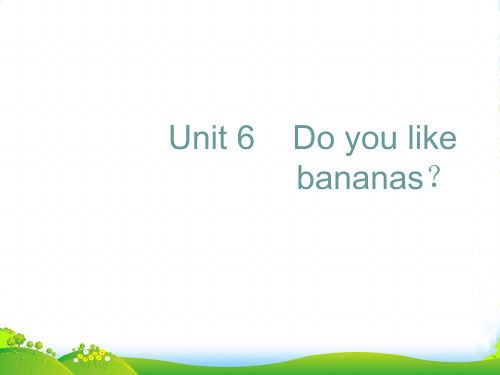

人教版七年级英语上册Unit6 Do you like bananas教课设计课题Unit 6 Section A 1a /1b /1c /2a /2b.课型New一、知识与技术:1)单词:do,don ’ t,does,doesn’ t,strawberries,like,have,bamburgers,orange,tomatoes,icecream,broccoli,salad,French fries, bananas.2)句型: Do you like bananas?教课目的Yes, I do. \ No, I don’ t.经过学习本课,学生能够用英语相互议论喜爱与不喜爱的食品。
二、过程与方法:1)睁开多种任务型的听力活动,获取理解、辨别和办理与讨论爱好、憎恶有关的信息。
2)经过小组议论、睁开检查等研究,明确在用中学、沟通中学习的想法。
三、感情态度价值观:议论美食,享受生活美味,倡导健康合理饮食。
教课要点掌握对于食品的词汇。
教课难点学会使用社交用语 Do you like bananas? Yes,I do.\ No, Idon ’ t.课前准备录音机、多媒体课件教课过程:设计企图Step1. Warming upStep 2 Presentation经过让学生猜冰箱里有哪些食品的形式,导出新的单词。
同时让全体学生拼读每个单词、让个别学生将单词写到黑板上。
Step3.Task 1部署一项任务:老师手持一个盒子, 让同学猜猜老师最喜爱的食品.规则为学生只好问老师问题而老师只用“Yes”或“No”回答。
达成 Section A, 1a, 1b.Step 4. Task 2部署拓展性任务:要求同桌学生合作编一个小型对话,主题为咨询他人喜爱或不喜爱的食品。
要求使用刚学过的食品类单词以及句型,同时也能够适合地加入课外单词(老师请一程度较好的学生先进行示范)。
Step 5.达成课文32 页 Section A 听力练习activity 2a, 2b.Setp 6.当堂听写听写单词与句型,进一步稳固本课学习内容,并将本课应掌握的单词和句型落实到“写”上,使学生不只会说同时会写。
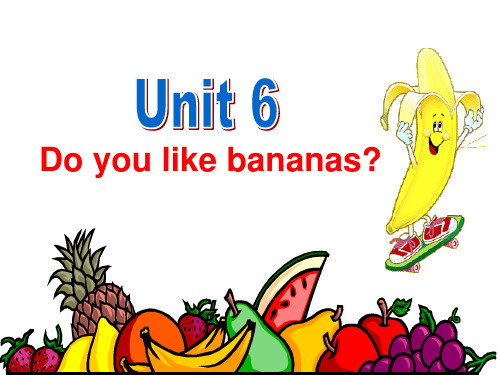
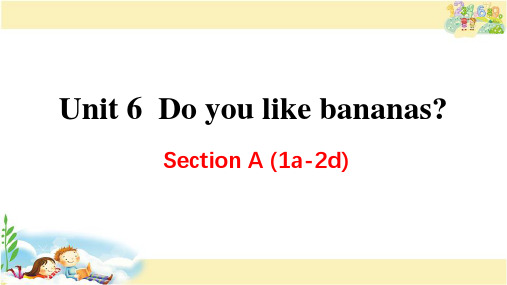

亲爱的同学:这份试卷将再次记录你的自信、沉着、智慧和收获,我们一直投给你信任的目光……学习资料专题Unit 6 Do you like bananas话题写作范文你是一个中国女孩,英文名字是Cindy。
下表是你的一日三餐,你身体健康。
快向大家介绍一下你的饮食习惯吧!写作要求:1.表格中的食物要全部写出。
2.可写出不喜欢吃的食物。
3.50词左右。
________________________________________________________________________________________________________________________________________________________________________________________________________________________________________________________________________________________________________________________________________________________________________________________________________________________________________________________________________________________________________________________________________________________________________________________________________________________________________________________________________________________________________________________________________________听,并跟读下列范文Hello! I am a Chinese girl. Cindy is my English name. I eat well. For breakfast,I like eggs and some milk. For lunch, I have some rice and vegetables. I have chicken and some fruit for dinner. I don't like hamb urgers, salad or icecream. I don't think they are healthy. I really like apples and bananas. I have good eating habits.I want to be healthy. What about you?。

初一英语Unit 6 Do you like bananas? 人教版(新目标)【本讲教育信息】一. 教学内容:Unit 6 Do you like bananas?(一)语言目标谈论爱好和厌恶。
(二)语言功能学会用英语表达自己喜欢或不喜欢的东西,询问别人是否喜欢,提出建议。
(三)重点句型Do you like bananas? Yes, I do./No, I don’t.I like French fries. I don’t like tomato es.(四)主题词表(五)重点词汇及短语词汇:like, hamburgers, tomatoes, broccoli, French fries, oranges, ice cream, salad, bananas, eggs, carrots, strawberry, apples, chicken, breakfast, lunch, dinner, fruit, vegetable.短语:a lot of like to do sth. like doing sth.(六)语法1. 动词like的用法。
2. 一般疑问句的肯定、否定回答。
3. 名词复数的使用。
(七)重难点分析:1. 可数名词和不可数名词(1)可数名词:①定义:是可以计数的名词。
②可数名词前可以用a,an限定。
③可数名词前可以用one,two,three…限定。
④可数名词有复数形式。
(2)不可数名词:①定义:指不能计数的名词。
②不可数名词前不可以用a,an限定。
③不可数名词前不可以用one,two,three…限定。
④不可数名词没有复数形式。
2. 一般名词的复数形式(1)一般在名词词尾加-s。
如:banana-bananas(2)以-o,-s,-sh,-ch及-x结尾的名词,在词尾加-es构成复数形式。
如:tomato-tomatoes (3)有些以-o结尾的名词仍加-s。
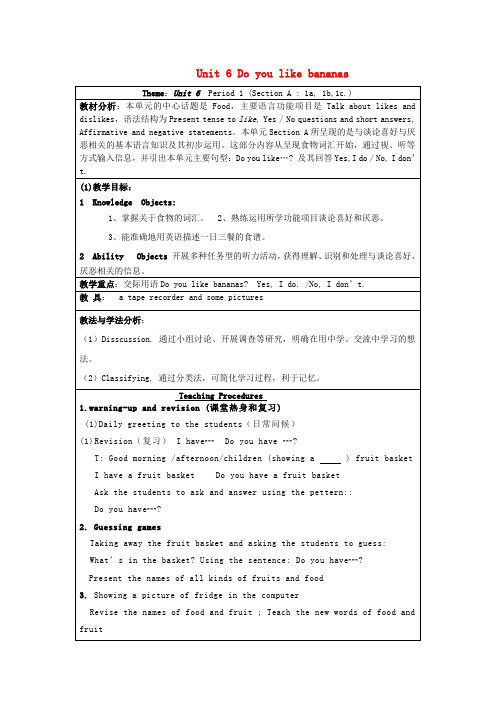
Unit 6 Do you like bananasUnit 6 Do you like bananas? 教学设计⑥1.复习词汇:like 2.词汇:banana ,hamburger ,tomato ,broccoli ,French fries , orange ,ice cream ,salad ,strawberry ,breakfast ,lunch , dinner ,egg ,apple ,chicken ,fruit ,vegetable3.句型:Do you/they like salad? Yes ,I/they do ./No ,I /they don ’t .Does he/she like salad? Yes ,he/she does ./No ,he/she doesn ’t.I/They like oranges . I/They don ’t like oranges .He/She likes ice cream . He/She doesn ’t like bananas .语法重点:动词like 一般现在时的肯定句、否定句和一般疑问句的用法以及肯定与否定的回答。
Step Ⅱ Exercise 随堂练习设计(1)翻译填空1.你喜欢吃香蕉吗? _______ you __________ bananas?2.艾米丽的哥哥不喜欢吃草莓。
Emily’s brother ________ _______strawberries .3.凯特早餐吃鱼吗? ______ Kate like fish ________ breakfast?4.你晚饭常常吃什么? What _______ you usually have ______ _________?5.我叔叔常常吃冰淇淋作甜食。
My uncle usually ______ ice cream ______ dessert .(2) 用所给词的适当形式填空1. Bob (like) French fries.2. I want some ______(tomato) for dinner3. Would you like some ______(salad)?4. How ______(much) eggs do you have?5. You can see ________ (lot) of pictures in his room.(3) 任务型阅读:根据表格内容完成下面的短文NameJoy Smith AgeFifteenlike SportFoodColoryellowDislike Sport FoodColor red Joy is a boy. He is fifteen years old. His last name is __________. Hoy is his _________ name. He likes to play ___________. He doesn’t like to play __________.。
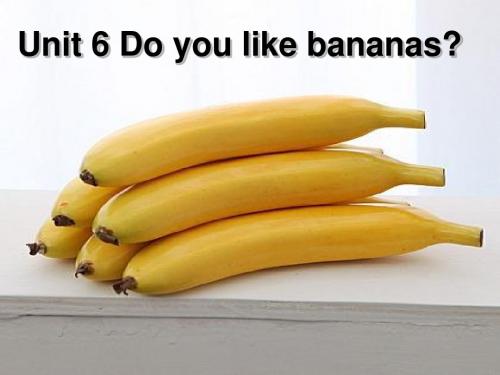

人教版英语七年级上册第五单元Unit 6 Do you like bananas?重点句子背诵同学们,英语的学习中,重点句子的积累至关重要,一方面,它们是语法知识的体现,另一方面,它们又是书面表达的基础,因此这些句子的积累和运用就显得至关主要。
接下来,我们就来总结一下七年级上册第六单元的重点句子。
1、Do you like bananas? 你喜欢香蕉吗?这是由助动词do帮助动词like引导的一般疑问句,由陈述句I like bananas得来。
回答:Yes ,I do. \ No , I don’t.2、Does she like tomatoes? 她喜欢西红柿吗?这是由助动词does帮助动词like引导的一般疑问句,由陈述句She likes tomatoes得来。
回答:Yes , she does. \ No , she doesn’t.同样,Does Tom like icecream?(汤姆喜欢冰激凌吗?)是由助动词does帮助动词like引导的一般疑问句,由陈述句Tom likes icecream.(汤姆喜欢冰激凌。
)得来。
回答:Yes , he does. \ No , he doesn’t.3、Do they like pears? 他们喜欢梨吗?这是由助动词do帮助动词like引导的一般疑问句,由陈述句They like pears得来。
回答:Yes , they do . \ No , they don’t.4、I like bananas. 我喜欢香蕉。
5、She likes hamburgers. 她喜欢汉堡包。
6、He likes icecream. 他喜欢冰激凌。
7、They like tomatoes and carrots. 他们喜欢西红柿和胡萝卜。
从第4句到第7句,要关注的点如下:第一,关注主谓一致:当主语是第三人称单数的时候,谓语动词用相应的第三人称单数形式,例如:She likes \ he likes\ Alice likes \ Tom likes等等;当主语不是第三人称单数的时候,谓语动词用原形,例如:I like \ They like \ We like \ Tom and Grace like等等。

人教新版英语七年级上册Unit6说课稿尊敬的领导、同事,今天我要说的是人教版七年级英语上册Unit6 Do you like bananas?的第一课时。
本单元的中心话题是食物,主要语言功能项目是谈论喜好和厌恶,语法结构是现在时的to like,Yes/No问题和短回答。
n A的内容从呈现食物词汇开始,通过听、说、读等方式输入信息,并引出了本单元的主要句型:Do you like…?及其肯定回答Yes。
I do./否定回答No。
I don’t。
教学目标:学生能够掌握单词如hamburger,French fries,salad,ice cream,tomato,broccoli等等。
能够用英语谈论自己喜欢和不喜欢的食物。
通过丰富多彩的活动,让学生体会研究英语的快乐,谈论美食,享受生活美味。
了解中西方膳食的不同。
教学重点:1.掌握关于食物的词汇。
2.熟练运用所学功能项目谈论喜好和厌恶。
教学难点:1.交际用语Do you like…?肯定回答Yes。
I do.否定回答No。
I don’t。
第三人称单数:Does she/he like…?肯定回答Yes。
she/he does.否定回答No。
she/he XXX.一般现在时,主语是三单时,助动词与动词的变化。
3.掌握可数名词单,复数和不可数名词的区别。
教学方法和研究策略:以多媒体辅助教学,实物展示贯穿整个教学,增加直观性和趣味性,提高教学效果。
通过听、说、读、写、竞赛等多种类型的任务活动,增强学生合作意识和自主研究。
为了完成教学目标,达到培养学生的综合素质的目的,整个教学过程设计力求发挥学生的主体作用。
积极倡导自主、合作、探究的研究方式,并体会到成功。
教具准备:本课以多媒体课件为辅助教学手段。
生们已经被吸引住了。
为了让学生更好地理解和掌握新知识,教师通过提问的方式引导学生逐步掌握关于食物的单词和语法知识。
5.实物展示。
教师拿出苹果,香蕉,梨和桔子等水果进行实物展示,让学生通过观察和感受来了解这些水果的外观和口感特点。
